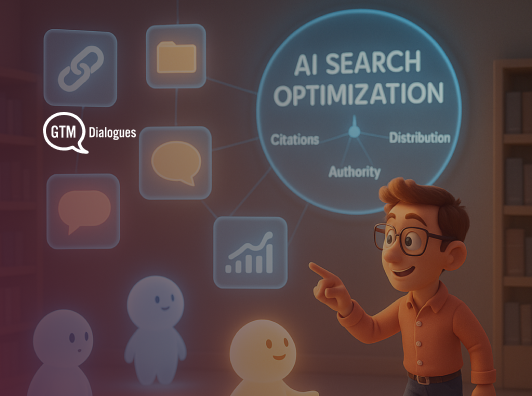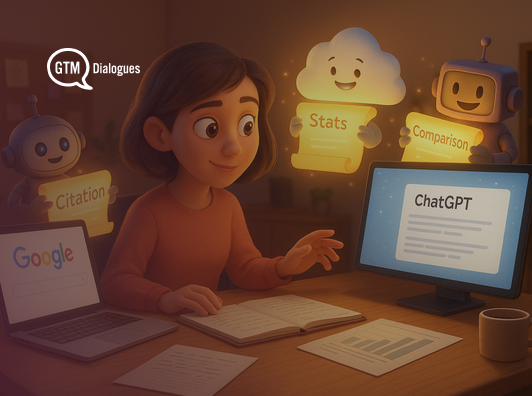“Organic social media is dead.”
I have heard it so many times now. And it’s not entirely wrong.
Businesses are witnessing limited success despite several tactics and experiments. These platforms change their algorithms now and then. We must understand that these social media platforms are also here for money. Hence, they encourage the "pay-to-play" nature of social platforms.
But is everything so gloomy?
Not really!
Despite challenges, organic social media remains crucial to digital marketing strategies. In fact, it is more important than ever.
In the early days of social platforms, businesses could easily reach a large percentage of their followers with each post. As user bases grew, so did the volume of content generated. Platforms introduced algorithms to curate users' feeds, prioritizing content deemed most relevant or engaging.
This shift led to a decline in organic reach, with some studies suggesting that Facebook posts now reach as little as 5.2% of a page's followers organically. However, this doesn't mean organic social media is ineffective – it simply requires a more strategic approach.
In this article, I’ll debunk common myths about organic social media usage and provide insights into effectively leveraging its power.
Let’s start by tackling some of the popular myths.
Common Myths about Organic Social Media
Let’s debunk some common myths on organic social media:
Myth 1: Organic reach is highly limited
Reality: While organic reach has declined, quality content can perform well. The key is to create highly engaging, valuable content that resonates with your audience. Posts that generate meaningful interactions are more likely to be shown to a wider audience.
For example, HubSpot's LinkedIn page achieves impressive engagement rates by sharing insightful content such as marketing tips, industry trends, and actionable guides tailored to professionals. This demonstrates that organic reach is still effective for B2B brands that deliver content aligned with their audience's needs.
Myth 2: Organic social media doesn't provide measurable ROI
Reality: Modern analytics tools offer sophisticated ways to track the impact of organic social media efforts. Metrics such as engagement rate, click-through rate, and conversion rate can provide valuable insights into the effectiveness of your organic strategy.
Moreover, social listening tools can measure brand sentiment and share of voice, offering a more comprehensive view of your social media impact beyond simple reach and engagement metrics.
Myth 3: Paid social media is always more effective
Reality: While paid social media has its place, organic social media builds trust and fosters long-term relationships in ways that paid promotion cannot. Users often perceive organic content as more authentic and credible, leading to stronger brand loyalty over time.
Continued Importance of Organic Social Media
Organic social media is important even now. Here are some reasons why:
1. Brand Building and Customer Relationships
Organic social media provides a unique opportunity to showcase your brand's personality, values, and expertise. Businesses can build a loyal community around their brand through consistent, authentic interactions.
Take Slack, for example. The workplace communication platform has cultivated a strong B2B presence by sharing relatable, human-centric content on LinkedIn, showcasing how teams thrive using Slack. Their mix of thought leadership, customer stories, and witty, engaging posts has helped them foster a community of advocates and loyal users, strengthening their brand and driving growth.
2. Support for Other Marketing Channels
Organic social media doesn't exist in a vacuum – it supports and enhances other marketing efforts. For instance, social signals are believed to influence search engine rankings, making organic social media an important component of SEO strategy.
Additionally, social media can amplify content marketing efforts by providing a platform to share blog posts, videos, and other content, extending their reach and lifespan.
3. Cost-Effective Strategy for Small Businesses and Startups
For businesses with limited marketing budgets, organic social media offers a cost-effective way to reach and engage with potential customers. Small businesses can compete with larger competitors on a more level playing field by investing time and creativity rather than large advertising budgets.
Measuring Success in Organic Social Media
To leverage organic social media effectively, setting clear goals and tracking relevant metrics is crucial. Key performance indicators (KPIs) might include:
1. Engagement rate (likes, comments, shares)
2. Reach and impressions
3. Click-through rate
4. Conversions (sign-ups, sales)
5. Brand mentions and sentiment
It's essential to set realistic expectations. While you may not see immediate sales results, consistent organic efforts can increase brand awareness, customer loyalty, and conversions.
Virtually any type of business can use both organic and paid social media, but specific characteristics make each approach more suitable in different scenarios:
B2B companies that can effectively use organic social media
Listed below are some ways businesses can use organic social media effectively:
- Thought Leaders: Firms looking to establish authority in their industry by sharing insights, whitepapers, and industry updates (e.g., management consultancies, SaaS providers).
- Startups and SMEs: Small and medium-sized B2B companies with limited budgets but the flexibility to create impactful, authentic content that resonates with niche audiences.
- Educational or Insight-Driven Brands: Organizations with valuable, actionable information to share, such as market research firms, training providers, or industry analysts.
- Professional Services Firms: Businesses that can leverage case studies, success stories, and behind-the-scenes content to build trust and credibility (e.g., accounting firms, law firms, or IT consultancies).
- Tech and SaaS Companies: Firms offering solutions that can be showcased through demonstrations, testimonials, or user-generated content to highlight product value.
Focusing on their strengths and tailoring their content strategy can help B2B companies maximize the impact of organic social media.
Businesses that should consider paid social media
Below are examples of B2B companies that can benefit significantly by using paid social media:
- New B2B Companies: To quickly establish brand awareness and build a network of industry connections.
- Event-driven B2B Companies: To promote webinars, conferences, trade shows, or product launches to a targeted professional audience.
- Companies in Competitive B2B Markets: To stand out in crowded industries and position themselves as thought leaders.
- B2B Companies Targeting Niche Audiences: To leverage precise targeting options and reach decision-makers within specific industries or job roles.
- B2B SaaS or Subscription Models: To drive leads and conversions with tailored ads offering free trials, demos, or gated content like whitepapers.
- Seasonal B2B Businesses: To boost visibility and generate leads during key industry periods, such as end-of-fiscal-year purchasing or seasonal trade events.
This approach ensures that paid social media aligns with the unique challenges and opportunities of B2B marketing.
Effective Organic Social Media Strategies for B2B Companies
Below are some strategies you can use for leveraging organic social media:
1. Create High-Quality, Engaging Content
The cornerstone of successful organic social media is content that provides value to your audience. Depending on your brand and audience preferences, this could be educational, entertaining, or inspiring.
Video content, in particular, has shown solid organic performance across platforms. For instance, TikTok's algorithm can propel even accounts with few followers to viral status if their content resonates with viewers.
2. Leverage User-Generated Content
Encouraging and sharing user-generated content (UGC) can significantly boost organic engagement. UGC provides social proof and fosters a sense of community around your brand.
Salesforce excels at this strategy. The CRM leader actively features customer success stories, testimonials, and creative use cases shared by their clients on platforms like LinkedIn and Twitter. This not only highlights the real-world impact of their solutions but also inspires other businesses to share their own experiences, creating a collaborative and engaged community around the brand.
3. Keep an Eye on Algorithm Changes
While algorithm changes can be frustrating, they're often designed to prioritize content that users find valuable. Stay informed about platform updates and be prepared to adapt your strategy accordingly.
For example, when Facebook announced it would prioritize "meaningful interactions," many brands shifted their focus from promotional content to posts that sparked user conversations.
4. Utilize Emerging Trends and Features
Platforms often give preferential treatment to users who adopt new features. For instance, when Instagram introduced Reels, many users reported increased reach compared to standard posts.
Stay attuned to new features and trends on each platform, and be bold and experiment with them in your organic strategy.
Adobe has gained a massive following on LinkedIn using their carousel posts and Live events to showcase customer success stories, industry insights, and tutorials. By embracing these features, Adobe has boosted engagement, strengthened its authority in the B2B space, and created content that resonates deeply with its professional audience.
The Future of Organic Social Media
As we look to the future, several trends are likely to shape organic social media:
1. Increased focus on authenticity: Brands that showcase genuine, behind-the-scenes content will likely perform well as users become more discerning.
2. Rise of niche platforms: While major platforms will remain important, we may see more brands succeeding on niche platforms catering to specific interests or demographics.
3. Integration of AR and VR: As these technologies become more accessible, they could open up new possibilities for engaging organic content.
4. Emphasis on social commerce: The line between social media and e-commerce will likely continue to blur, creating new opportunities for organic engagement that drives sales.
Remember, social media is ultimately about building relationships. Paid promotion can amplify your message, but organic content forms the foundation of your brand's social media presence and fosters long-term customer loyalty.
As we move forward, the businesses that thrive on social media will view it not just as a promotional tool but as a way to create genuine connections with their audience.
In this light, organic social media isn't just still alive – it's more important than ever.
Talking of social media, don’t forget to follow GTMDialogues on LinkedIn. We post amazing b2b insights, trends, and playbooks for businesses to follow.
Frequently Asked Questions
1. Is organic social media still effective for B2B companies in 2025?
Yes, organic social media remains a powerful tool for B2B companies to build trust, showcase expertise, and foster long-term relationships. While reach has declined, strategic, high-quality content can still deliver strong engagement and results.
2. How can B2B companies measure the success of their organic social media efforts?
Success can be measured using metrics like engagement rate, reach, impressions, click-through rate, conversions (e.g., sign-ups or demo requests), and brand sentiment. Setting clear KPIs aligned with business goals is essential.
3. What types of content perform best for B2B organic social media?
Thought leadership content, case studies, industry insights, user-generated content, and educational resources such as webinars or tutorials tend to perform well. Video content, especially short-form, is particularly effective across platforms.
4. How can B2B companies overcome the challenge of declining organic reach?
B2B companies can overcome declining reach by creating engaging, audience-focused content, leveraging user-generated content, staying updated on algorithm changes, and utilizing new platform features like LinkedIn Live or carousel posts.
5. Should B2B companies combine organic and paid social media strategies?
Yes, combining organic and paid strategies is highly effective. Organic social builds trust and long-term relationships, while paid campaigns amplify reach, target specific audiences, and drive immediate results. Both approaches complement each other for a balanced strategy.































